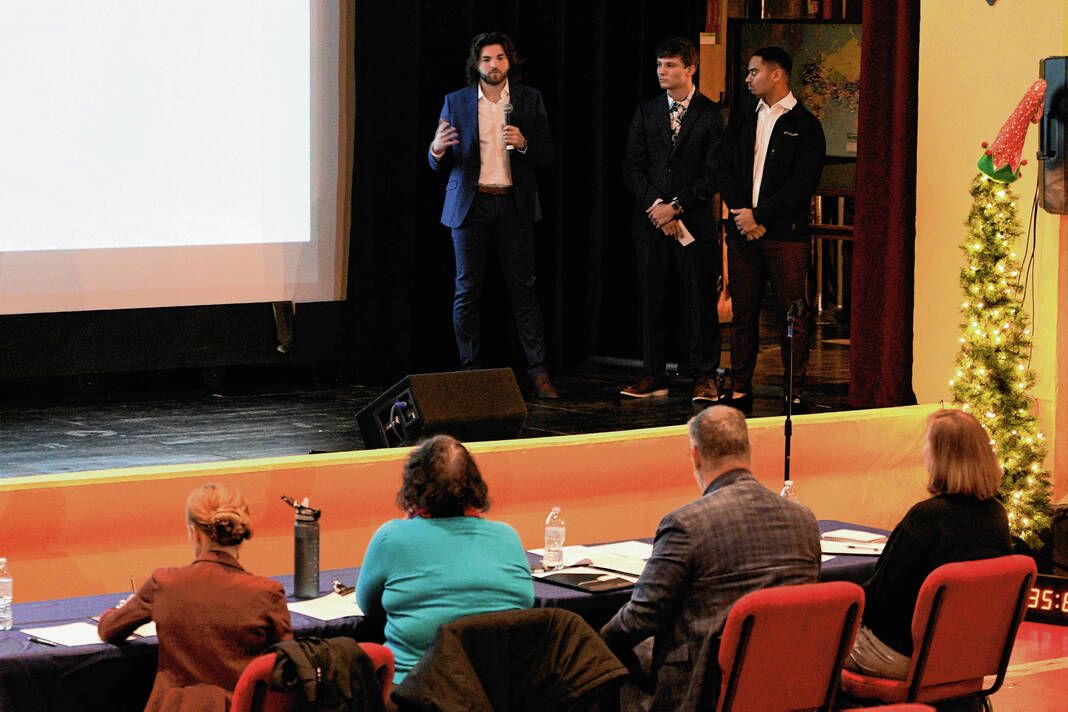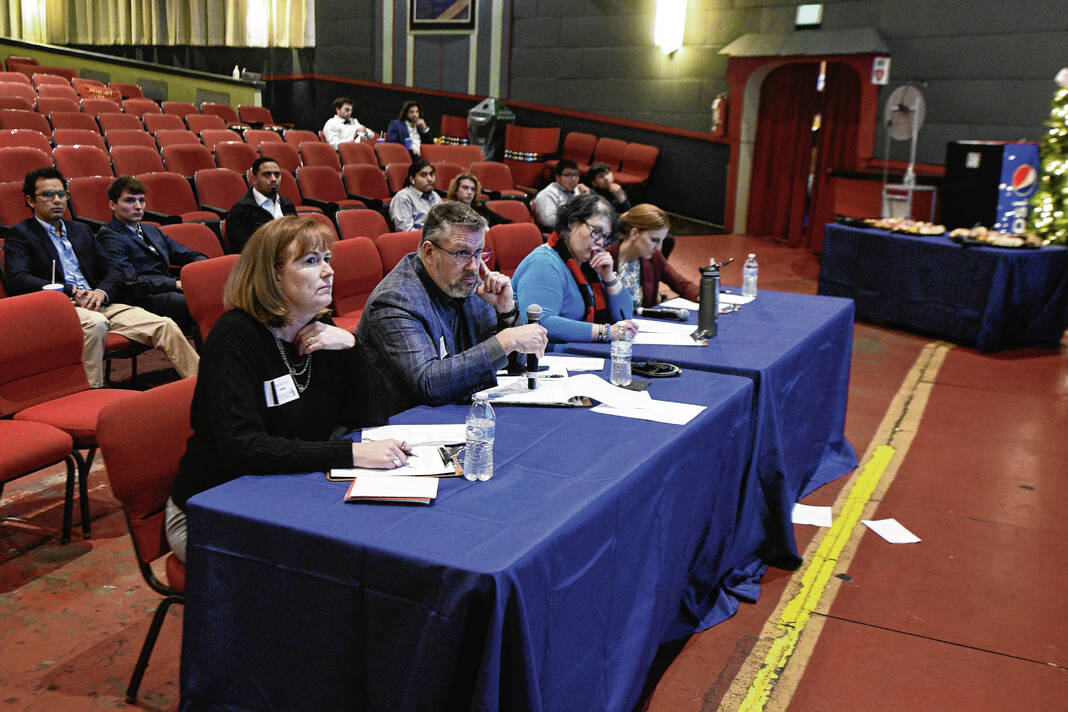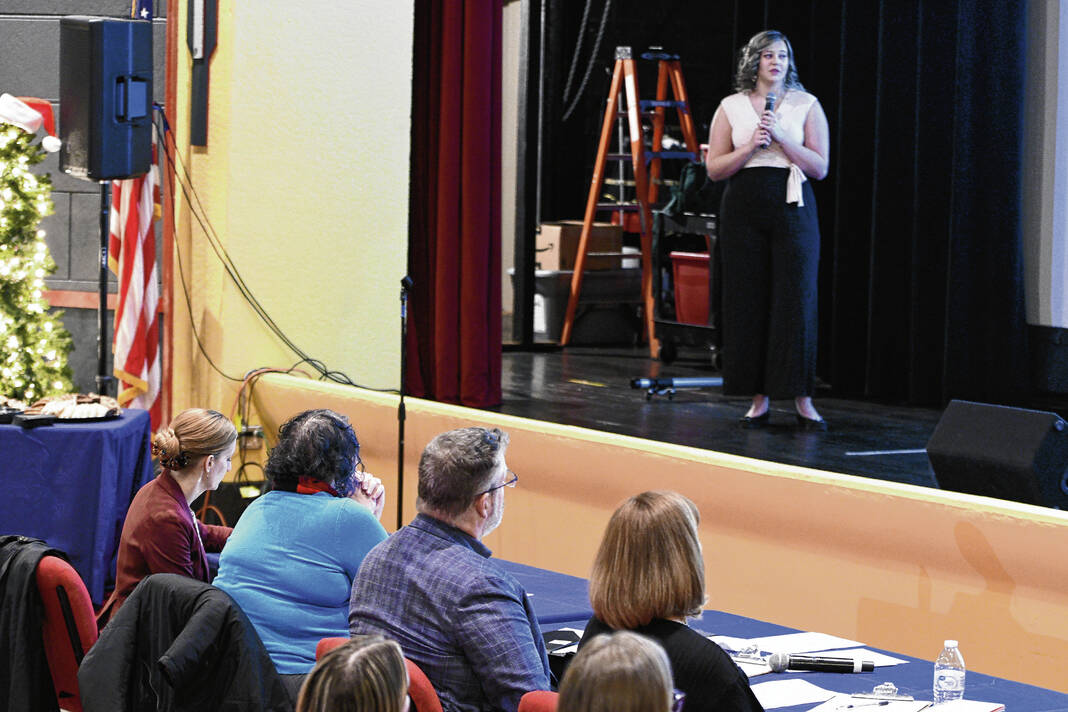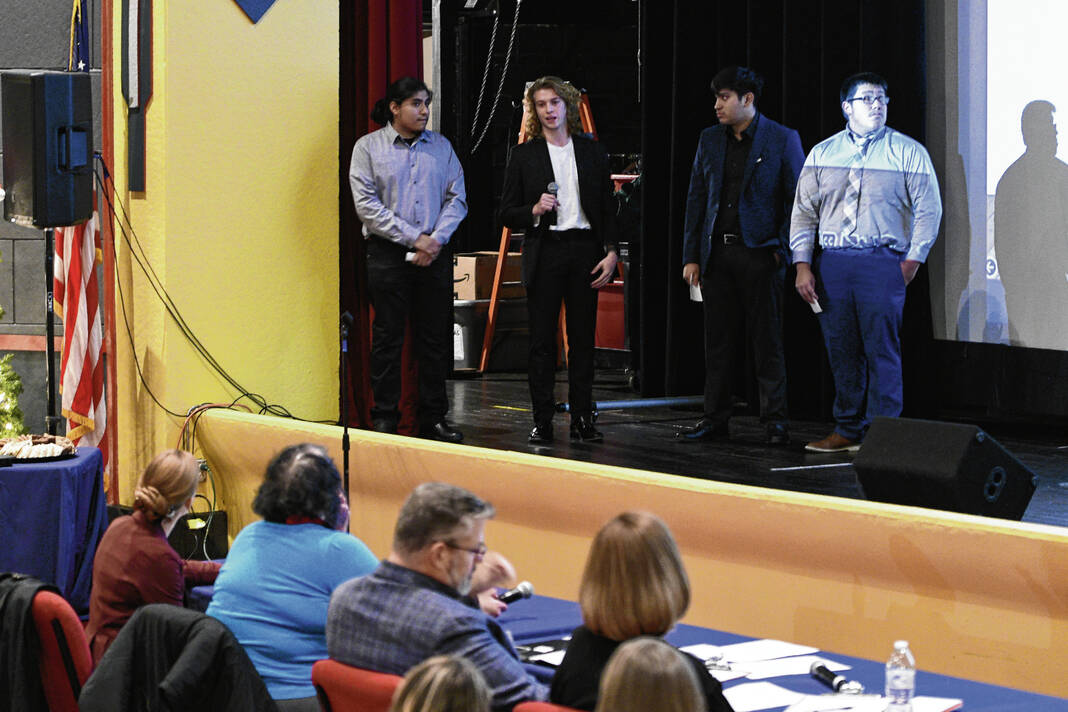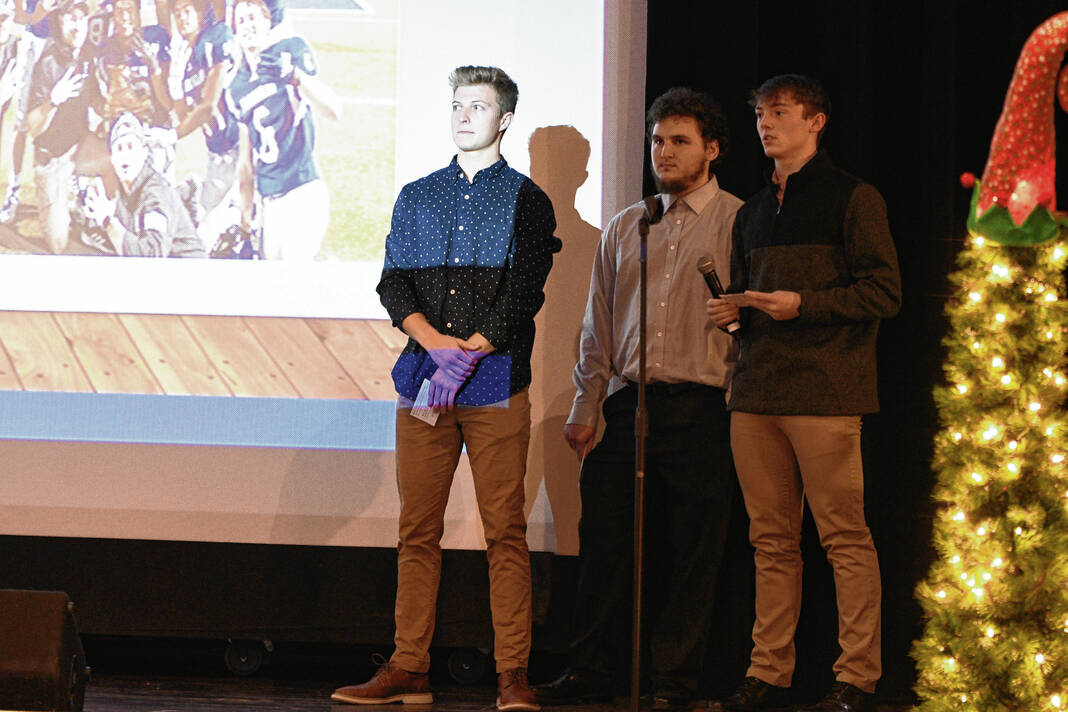From a convenience store for college students and specialized workouts for different types of athletes to a tequila brand with a bottle containing a code for events, Franklin College students presented their best entrepreneurial ideas to adults with experience in business, most of whom were Franklin College alumni.
The event, which took place Tuesday at The Historic Artcraft Theatre, was modeled after the TV show “Shark Tank,” during which entrepreneurs present their business ideas to “sharks;” business people who decide whether or not they want to invest money in the product presented in exchange for a certain stake in the company.
While the companies the students presented about do not exist yet and the proposed investments were all hypothetical, the purpose of the event was to give students valuable advice in case they decide to develop their ideas further, said Jeremy VanAndel, who teaches the college’s Development of Entrepreneurial Mindset class.
“Any one of the projects being put together could be a valid business in the real world and there are several students who expressed interested in carrying on with their project after the class ends,” he said.
Entrepreneurial Ecosystems Vice President Julie Heath, along with Franklin College alumni Angela Coy, a partner with Compass Pointe CPAs, Bryan Epperson, vice president for AME Wealth Management, and Rochelle Swails, valuation director for Clifton Larson Allen, LLP served as judges for the event, which served as a program part of GRIZTUESDAY, an annual fundraising effort for the college. The judges gave feedback to students and asked questions about their preparation in developing ideas for the following businesses.
NIL Central
College athletes are now able to earn money off endorsement deals, called Name, Image and Likeness agreements, but the bulk of the deals go to Division I athletes, especially athletes in college football and basketball, the two most-watched college sports.
In order to gain visibility for athletes on Division II and III teams, which typically get less recognition, sophomore Brooke Stephens, along with Franklin College student-athletes Kai Ross, Jimmy Wolff and Jenna Louden brainstormed an idea to serve as a middle ground between athletes and companies.
“We wanted to reach out to schools and organizations to ensure all athletes felt included and reach out to different areas’ local companies and make sure our local athletes could represent their area rather than an athlete in Illinois supporting a (Franklin) company,” Stephens said. “Sports that aren’t as popular tend to get overlooked in NIL deals, and including club sports would be really important as well.”
NIL Central would help support athletes who have packed schedules and can’t look for endorsement deals themselves, Wolff said.
CASA 124
To senior Nagib Afani, tequila is “more than a drink.”
That’s why he wanted to start his own business centered on the alcohol. While there are plenty of tequilas out there, Afani said he knew what could make CASA 124 stand apart.
“The bottle, after the tequila is done, will serve as a sculpture,” Afani said. “If you buy it, you get a code, and it will give you access to private events; it creates community. From parties to tequila tastings and mixology classes, it creates community around the tequila.
Through developing the idea and taking the class, Afani realized he wanted to pursue the idea even after the class concludes.
“I’m from Mexico, and for me, tequila is more than a drink, it brings people together. I wanted to create something that brings people together,” Afani said. “I learned it’s a lot easier than I thought to start a business, creating a website and crunching numbers.”
Helping Warriors of America
When senior Payton Dilk’s uncle died after being hospitalized with COVID, Veterans Affairs, or the VA, took the disability checks he was receiving to offset the cost of medical bills he had incurred, leaving his wife with nothing.
The uncle, George Cantrell, had been collecting disability payments most of his life after he suffered severe injuries from Agent Orange during the Vietnam War. After surveying military members and their families, Dilk found all of them had issues with the VA, including one who wasn’t given disability payments because they determined his PTSD stemmed from childhood and not the military.
Seeing those frustrations, Dilk came up with the idea for Helping Warriors of America.
“It’s a fundraising platform available any time. It seeks donations from legions and reputable hospitals and connects veterans with hospitals for pro bono work,” she said. “Veterans and active military members can create an application or a family or friend can create a profile. On our part, we will share the fundraising platform with hospitals and other partnerships to create get as many donations as we can.”
GRIZZ MART
When students want something to eat late at night, they often don’t have anywhere to go on campus, as the Franklin College cafeteria often closes from 1:30 to 5 p.m. and is only open past 8 p.m. on Thursdays, when it opens temporarily from 10 to 11 p.m.
For hungry students, finding a meal can often mean traveling far beyond campus. The challenge of finding food within walking distance inspired the idea for GRIZZ MART, said Diego Luengas, who presented the project along with fellow students Jovany Sebastian, Lucas Stout and Daniel Mateo.
“The problem we discovered is that the dining hall is closed at night hours as well as having limited food options where it does not satisfy some students. This problem can occur for an athlete who has to stay late on campus and is not able to show up to dinner on time,” he said.
The store would not only have longer hours, but a variety of options, including snacks for students who are craving something that isn’t a full meal, Luengas said.
“The solution we came up with is GRIZZ MART, where students and faculty can shop like a regular store, where we provide frozen food, drinks and snacks,” he said. “Students will be able to swipe their student ID before entering the store, purchasing all their goods and anything they need to take with them at a self-service checkout.”
SUPERHUMANATHLETE
Franklin College athletes Ryan Small, Cody Samples and Dawson Dallape have all encountered workout regimens targeted to specific teams, such as baseball and football, but those workouts often are the same for teammates no matter what position they play.
There is a need for differentiation of workouts between positions, as they don’t all require the same physical training, which is where the idea for SUPERHUMANATHLETE came in, Small said.
“We provide position-specific workouts and different drills they can do to help them in their specific area,” Small said. “Instead of a general workout for a football player, here’s a workout and conditioning routine for a strong safety or wide receiver because that’s not something we felt was really present.”
Small said when he played football at Franklin Community High School, his coach would try and specify workouts for different positions, but doing so proved to be too time-consuming. Small said he hopes after the class, he and his project mates can hire a developer to create and update an app that would follow the ideas they presented for the class.
Career Finder
Students Zack Fichter, Braden McGowan and Dane Crick brainstormed the idea for a mix between a trade school and a liberal arts college with the hope of helping other students avoid post-collegiate careers they would lose interest in.
Career Finder would first find colleges willing to partner with the business through a contract, and students attending those colleges would then be able to use its services.
While the college social experience is missing from trade schools, often students attending liberal arts colleges take classes they might not find useful to fill requirements, McGowan said.
With Career Finder, students can receive career-specific training, including hands-on work with labs, so they could receive certification all while still attending their home college, Fichter said.
With the training, students will be more equipped to take on the careers of their choice, Crick said.
“America’s college students are not equipped for the workforce,” he said. “Hands-on training will determine if this is the career they want to go into, so they won’t waste valuable years of their 20s on a job they’re not good at or don’t enjoy.”


